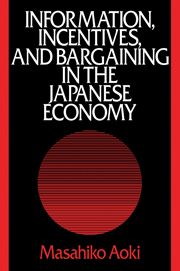 Information, Incentives and Bargaining in the Japanese Economy
Information, Incentives and Bargaining in the Japanese Economy Book contents
- Frontmatter
- Contents
- List of figures
- List of tables
- Preface
- 1 Introduction
- 2 The information structure of the J-firm
- 3 The ranking hierarchy of the J-firm as incentive scheme
- 4 Corporate finance, stockholding returns, and corporate governance structure
- 5 Bargaining game at the J-firm
- 6 The changing nature of industrial organization
- 7 Bureaupluralism
- 8 Culture and economic rationality
- Author index
- Subject index
- Frontmatter
- Contents
- List of figures
- List of tables
- Preface
- 1 Introduction
- 2 The information structure of the J-firm
- 3 The ranking hierarchy of the J-firm as incentive scheme
- 4 Corporate finance, stockholding returns, and corporate governance structure
- 5 Bargaining game at the J-firm
- 6 The changing nature of industrial organization
- 7 Bureaupluralism
- 8 Culture and economic rationality
- Author index
- Subject index
Summary
A treatise on the Japanese economy can never be complete without a discussion on the role of the government, as many in the West believe that a large share of credit for the economic development of Japan goes to the government. The bureaucracy is viewed as a coherent, farsighted planner, which, in close cooperation with the ruling Liberal Democratic Party (LDP), gives a clear growth-oriented boost to the market economy by means of its promotional and protective industrial policy, indicative economic planning, fiscal incentives, stabilizing monetary policy, and so on. An eloquent exposition of this view may be found in the developmental state theory of Chalmer Johnson, but its variations, sophisticated and vulgarized, are not difficult to find among academics, journalists, politicians, and the general public in the West.
There is, however, an equally powerful opposing view, often held by economists, which may be referred to as the market-supremacy theory. It sees the role of the government as being complementary and sub-ordinate to the workings of the market mechanism. According to this view, although the government has certainly provided a favorable environment, the main impetus to growth has come from the private sector - from active business investment demand, high private saving, and industrious and skilled labor operating in a market-oriented environment. Government intervention has merely accelerated trends already put in motion by private market forces. For example, it is argued that economic planning administered by the government may have helped generate a consensus concerning midterm as well as longterm expectations for firms to make macro-consistent investments.
- Type
- Chapter
- Information
- Information, Incentives and Bargaining in the Japanese EconomyA Microtheory of the Japanese Economy, pp. 258 - 297Publisher: Cambridge University PressPrint publication year: 1988
- 1
- Cited by


